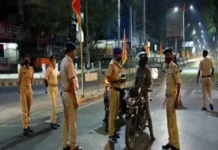The name ‘Bala Bharathi’ in Kurnool district is a magnificent example of what can be achieved when women set their minds to it.
“This is not an ordinary school. This is a victory monument that represents a heroic battle of poor women farm labourers against poverty for over two decades, and their triumph. The monuments are supposed to tell the future generations the story behind it,” Vijaya Bharathi revealed the theme of the Bala Bharati School that has come up at Orvakal in Kurnool district of Andhra Pradesh.
A botany lecturer turned activist and the force that has changed the profile of the politically turbulent mandal in the state, Vijaya Bharathi, is a product of the anti-arrack movement of the 1980s.
Vijaya Bharati, came on deputation to the Kurnool district to draft women into the nascent thrift movement as part of the poverty eradication efforts of the government. Later, she resigned from the government to become a full-time organiser of the women’s movement here.
Showing the massive doors and windows, pillars, marble floor, decorated walls, expensive Burma teak interior and the sprawling playground of the Bala Bharathi School (BBS) she talks like a historian and says “this huge building is not built simply with the sweat and blood of the women labourers, it is also mixed with their self respect.”
Vijaya Bharati, whose women mobilisation culminated in the construction of India’s first of its kind school rubbishes any suggestion that this was a waste of hard-earned money.
“Environment does play a role in moulding the student’s psychology. Talk to our students, how proud they feel of their school. This school has changed their attitude toward school and English medium,” she told #KhabarLive.
The BBS looks like a “school in a palace”. Before its grandeur many expensive private schools pale into insignificance and as for the quality of education, the school, managed by illiterate women is second to none in the state.
It took nearly eight years for the completion of two floors brick by brick and wall after wall. A third floor, to accommodate a science lab, a library, computer lab and an auditorium, is fast coming up.
More than 10,000 women labourers from 27 villages of the Orvakal Mandal pooled money they had saved for two decades under the Podupu Lakshmi scheme (thrift movement) to purchase the land to construct the building at a cost of a whopping Rs 7 crore.
The women’s organisation called Orvakal Mandal Podupu Lakshmi Ikya Samakhya (OMPLIS) purchased three acres and Vijaya Bharati donated another four acres.
Except for the design and the supervision of the work, everything came from the women.
“The women and their husbands along with their children worked in turns to do the construction work. The building needed about 250 pillars. Since it is rocky terrain, hard labour is necessary to excavate trenches. The estimated cost was Rs 25,000 per pillar. So, we have families who specialised in this type of work. They volunteered to do the job, thus we saved a huge amount,” she said.
Why English Education Only, Not Telugu?
“With Telugu, you cannot go round places outside Andhra. This needs the English language,” Syed Tajunnisa, secretary of the management committee said, narrating how they suffered because of the language handicap.
“In our 22 year long journey, we had been inspired by many IAS officers, foreign delegates, representatives of UNDP (United Nations Development Project) and others. We found language as an insurmountable barrier when we, as community resource persons, were touring other states with unknown languages. We didn’t know their language and they could not understand ours. We both were forced to speak in ‘English’,” she laughed shyly.
“We used to manage with half a dozen English sentences we were taught at Orvakal training institute. We would get back home after every interaction with officials with a sense of inadequacy. This compelled us to think of a better education for our children at least,” said Tajunnisa.
“We cannot afford English medium education for our children. We have to send them to Kurnool city which is 25 km away from Orvakal. We deliberated upon the idea of having our own school, a nice building with high quality English education. The decision to have a monument-like building with the huge ground was a unanimous one,” Chennuru Vijayalakshmi, President of the management committee told #KhabarLive.
Constructed on seven acres of land, the building has 40 rooms. The strength of the school is 720 and half of them are girls. It has spacious classrooms with sparkling floors. To give an appealing look for children, each classroom is painted with different colours and named after freedom fighters and scientists like Dr Abdul Kalam.
According to Clement Satya Babu, principal of the school, group discussions are an important ingredient of the curriculum. Clement, a retired officer from the Army Education Corps says the school is run in an informal atmosphere and teaching is student-centric. “We ensure students enjoy every minute of their stay at school,” he said.
The school is a self-governed, non-profit institute. The fee structure is determined based on administrative costs. Everything is determined by the women and who are formed into various committees. They meet once in three months to review the working of the school and decide the steps to be taken to improve the school. Every work is done with labour contribution.
The fee varies from Rs 4700 per year for nursery to Rs 13,500 per year for Standard ten. The school operates eight buses and the transportation charges, from Rs 2000 to Rs 4000 per year, are minimal.
“The fee is not more than one-tenth of what is normally collected by private schools in Kurnool city. We are following student-oriented teaching techniques. This is helping our children, who come basically from illiterate families, cope up with English medium without passing through any trauma,” the women said.
What stands out is the amazing camaraderie among the members. Even though members come from various castes, religions, social backgrounds they never caused fissures in the movement which has been flourishing for 22 years.
A Determination To Defeat Poverty
Crushing poverty and determination to break free from it brought women like Erukala Ramasubbama together and made them into a formidable force against the domestic violence and rampant alcoholism. They worked like commandos against domestic violence and earned accolades from the people.
Ramasubbamma, a gypsy woman, once used to beg around these villages for the leftover food in exchange for brooms. A small hut of gunny bags under the shade of a neem at the corner of the village was her address. She was not allowed to enter any house.
Now, after 22 years, Ramasubbamma, a proud owner of a decent house with well-settled children, owns half a dozen milch animals. And the same village has now accepted her as a brave leader. This unbelievable transformation is visible in her starry eyes.
She took nearly Rs 20 lakh as loan from banks for her business and repaid it. The OMPLIS boasts of having more than 10,000 Ramasubbammas who narrate their stories of battles they waged over oppression, violence and destitution with chilling details.
“We drove the poverty away from our lives. So, the next target we had set to achieve was English education to our children in a decent school,” said Ramasubbamma, backed by fellow members. This school is our major achievement, she says and praises the Podupu Lakhsmi movement.
Origins Of The School
Like rivers that often take their birth from a small spring, the school also traces its origins to the night schools the women started for adults in 1996, as part of the “Podupu Lakhsmi” movement of the Andhra Pradesh government. Vijaya Bharati was in charge of the program.
Later, the women who joined the movement launched a campaign for the eradication of child labour from the farms, which resulted in the establishment of a Bridge School called Bhavita.
The women surveyed local cotton fields and rescued about 1200 child labourers. They were admitted to the school. As the Bridge School was a temporary arrangement, the women thought of having a permanent school with their own money and this how Bala Bharati School came into existence.
The school, begun in a modest shed, was a phenomenal success. The students from the school became nurses, engineers, SIs, government teachers. One from their ranks rose to become a PhD scholar.
The thrift movement, which imbibed the values of anti-liquor movement of Andhra women in 1980s, has brought an economic revolution of sorts in the area.
The women, who had struggled to make both ends meet two decades back, now own assets worth lakhs of rupees and the success brilliantly reflects in the Bala Bharati School building which was built with an aim to serve the community for 100 years. #KhabarLive







